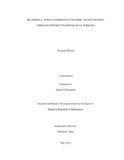
Please use this identifier to cite or link to this item:
https://hdl.handle.net/20.500.14301/213| Title: | BECOMING A ‘GOOD’ MATHEMATICS TEACHER: AN EPIC JOURNEY THROUGH DIFFERENT MATHEMATICAL TERRAINS |
| Authors: | Sharma, Toyanath |
| Citation: | Sharma, T.(2012).Becoming a ‘Good’ Mathematics Teacher: An Epic Journey Through Different Mathematical Terrains |
| Issue Date: | May-2012 |
| School: | SOED |
| Department: | DOSE |
| Level: | Masters |
| Program: | Master of Education in Mathematics Education |
| Abstract: | This dissertation portrays my experience as mathematical learner and as a novice teacher from the viewpoint of autoethnography as the genre of writing and research that connects the personal to the cultural placing the self within a social context (Reed Danahav, 1997). I have presented comprehensively my learning practice of mathematics at school, colleges and University, teaching practices of mathematics at school. To portray my research study, I have chosen an autoethnography as a method and methodology of research and critical research as a key research paradigm. Autoethnography helped me to produce the research text of my cultural and professional contexts of learning and teaching mathematics. The critical paradigm helped me to identify my research problem, to critically reflect upon my teaching-learning experiences and to transform my teaching/learning from traditional conception to new conception. Meanwhile, I have also used interpretivism and postmodernism as supportive referents ii and paradigms for the critical paradigm of my research. In regard to theoretical referents, I have considered critical theory, constructivism and different learning theories as my guides. Reflective practice is my focal point in this research. I hope to have focused on my journey from traditional mathematics learner to critical teacher researcher. In this process, I have continuously focused on relationships, contradictions, and the transformative possibility of my thinking and actions with reference to critical reflexivity as my quality criteria. This epic journey has also seen various moments of my mathematical learning which seemed to have influenced by various factors and facets that correspond to the situation where some children of Nepalese school are still facing similar problems for learning mathematics meaningfully. So as an autoethnographic researcher, I hope that this dissertation might provide the way out for those students whose mathematical learning appears to have been influenced by various factors that I have faced during different learning stages in my life. I also used this autoethnographic portrayal ‘to explore the problem of the culturally decontextualised nature of Nepali mathematics education’ (Luitel, 2007, p. 219) and to transform my own pedagogical practice as a practitioner, learner and teacher being critically aware of my lived reality and also create an avenue for professional educators, teachers and practitioners to rethink their own pedagogical practices (Smith, 2001, as cited in Luitel, 2007). In the process of narrating and performing my stories, I have attempted to set my journey of learning and teaching mathematics to present my extensive experience as a student situated in traditional teacher-centered classroom from early school days, to college and university level of study attempting to make a significant departure to iii managing a ‘student-centered’ during my teaching career at primary level mathematics classroom teaching. I hope to have used some ingredients of transformative learning and teaching. As a result, I felt like I could be a teacher researcher through my reflective practice of teaching and learning mathematics. Furthermore, I have duly realized that reflective practice could be instrumental in bringing transformation in meaningful learning of mathematics. |
| URI: | https://hdl.handle.net/20.500.14301/213 |
| Appears in Collections: | Dissertation |
Files in This Item:
| File | Description | Size | Format | |
|---|---|---|---|---|
| Thesis_Toya_med_math.pdf | 1.72 MB | Adobe PDF |  View/Open |
Items in DSpace are protected by copyright, with all rights reserved, unless otherwise indicated.